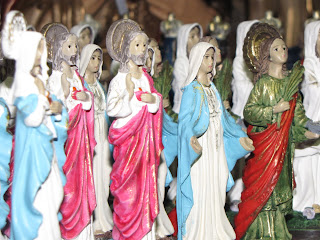
‘Jeito’ means the way. But there’s another word, jeitinho, which literally means the little way. In other words, jeitinho means a way around. Brazilians are excellent at finding ways around what seem like impenetrable walls. Historically, using jeitinho has been key to avoiding persecution (of religion, of music, of dance). Slaves couldn’t practice their native religions? Meld Catholic names with African deities and you have one of many Afro-Brazilian cults like Condomblé. Slaves couldn’t rebel against their owners? Create a martial art disguised as an acrobatic dance and call it capoeira. There’s another way to see this flexibility. Brazilians don’t necessarily see a contradiction in considering themselves Catholic while attending Afro-Brazilian cult ceremonies.
On paper, Brazil has the largest Catholic population in the world but looks and numbers can be deceiving. This country is Catholic culturally but not so religiously. People attend weddings and baptisms but seldom find themselves in church otherwise. Brian, who has been coming and going between the US and Brazil for the last fifteen years, says that Minas Gerais, a politically and socially conservative state, is the exception to Brazil’s lazier faire attitude towards religion. It is the one place where we have seen people attending mass on a regular basis, both in Belo Horizonte and out in the countryside.
Throughout Brazil, the Catholic Church has been steadily losing out to the more charismatic Evangelical churches. This is especially true in the poorer areas. Many people in favelas (shanty towns) turn to Evangelicalism as a way of rising above the drug wars prevalent in their neighborhoods, and even, potentially, getting out. The popularity of these churches is not surprising given that they offer social services and are available 24-hours a day to their congregations.
Easter is two days away and the way I know this is that all the stores have been taken over by Nerf football-sized chocolates hanging from arches throughout and that the city seems deserted because it’s a long weekend for most people. Yet, going back to that ‘flexibility,’ Good Friday seems to be the one day a lot of Brazilians seem to honor their Catholic roots. Unlike our defiantly unreligious friends who had us over for a barbeque today, most ‘Catholics’ don’t eat meat today! So Happy Easter to you all, whether you believe or just enjoy the chocolate.
**Note: Not being a Catholic (I'd say I'm border-line Agnostic/Atheist), I didn't realize that Good Friday is much more significant to Catholics (Brazilian or otherwise) than Easter Sunday. As a Catholic woman put it, "We Catholics love to suffer." (or was it that Catholics love suffering? Hmmm)
No comments:
Post a Comment